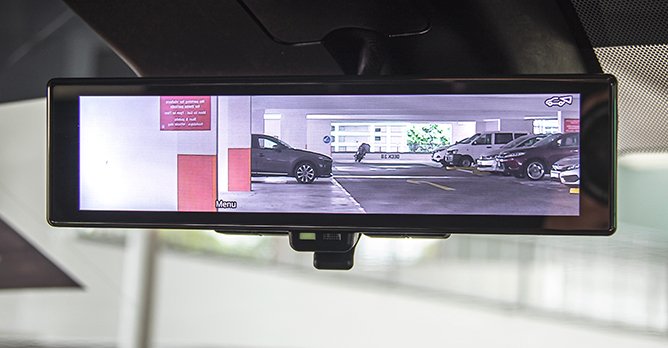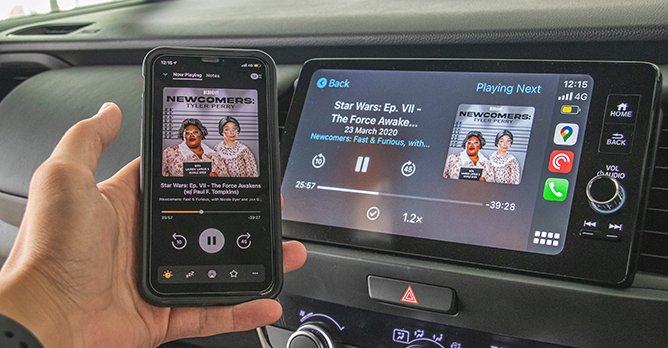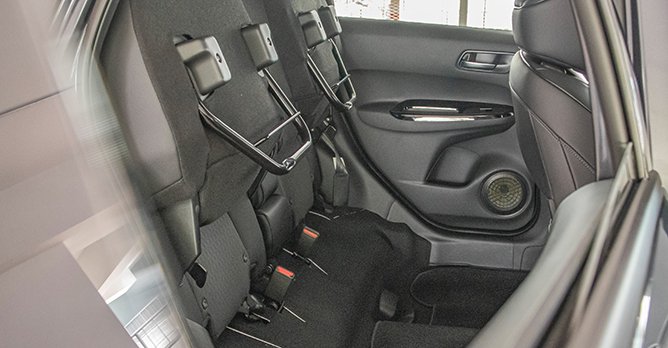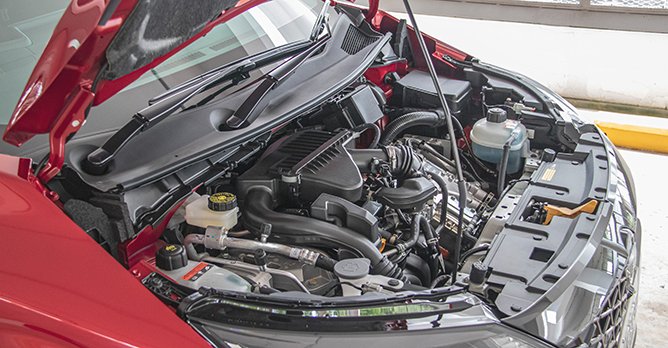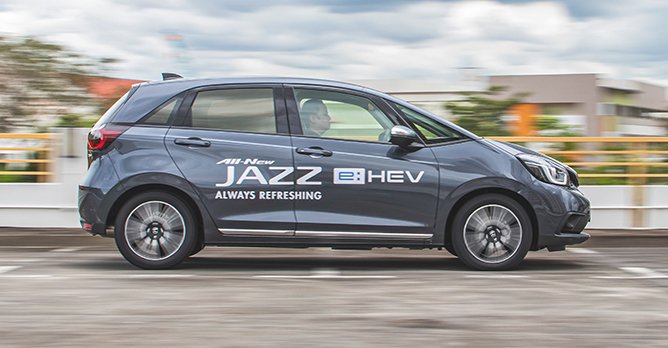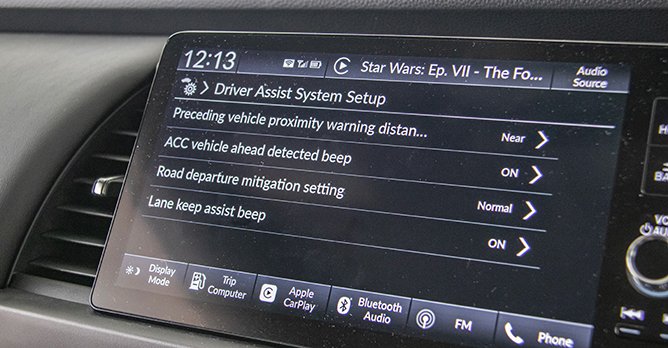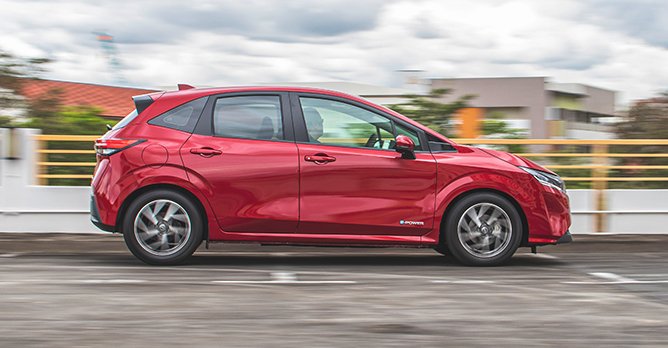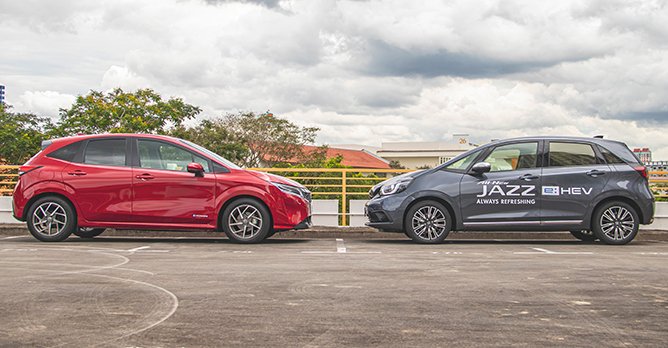Honda Jazz Hybrid vs Nissan Note e-POWER Hybrid
20 Aug 2021|31,259 views
Honda Jazz
More comfortable and flexible cabin
Ample technology and safety systems
More refined and efficient powertrain
Nissan Note
Pleasing exterior design
Drives with greater agility and briskness
Simple, straightforward and easy-to-use
The Honda Jazz and the Nissan Note are two models that have always proved popular among buyers - compact, practical and relatively affordable, these models were excellent first cars, but of course isn't limited to just that. Whether it's for beginner drivers, small families or even older folks, these models deliver a simplicity and accessibility that's certainly desirable.
Now, the latest iterations of these models are here, with both bringing more than a touch of modernity in the form of brand new hybrid powertrains. Which one is better?
Look and feel
The new generation Jazz has caused much controversy over its design. It's certainly not pretty, with its smooth surfaces and rounded edges. I personally don't find it particularly offensive, but some people do.
The Note is definitely the better-looking car. It's sleek, sporty-looking, and just has a much more typical look as far as compact hatchbacks are concerned.
Inside, the Note continues to impress with its overall sleekness. You get a good amount of leather surfaces that adds a touch of class, while the expansive digital dashboard and Intelligent Rearview Mirror offer plenty of modern solutions. However, the infotainment system does feel slightly dated - the graphics are quite old school, and connectivity is limited to wired Apple CarPlay and Android Auto.
The Jazz has a more funky vibe to it, especially with the contrasting plastic trimmings across multiple surfaces. On first impressions, it perhaps doesn't feel quite as high-quality as the Note.
However, spend some more time in it and the Jazz begins to reveal its aces. The cabin construction, especially with the reduced A-pillars, creates a much more spacious interior. You get wireless Apple CarPlay, which helps to elevate the otherwise ho-hum infotainment interface. And, while the upholstery may not be full leather like the Note, the Jazz's seats are actually much more plush and comfortable.
As far as space and daily practicality goes, the Jazz easily trumps the Note. With the rear ULTRA seats, you can fold the seat bases upwards to create a big loading space in the rear cabin. And, even though the Jazz has the smaller 284-litre boot (the Note has 340 litres), the Jazz offers more flexibility when it comes to hauling capacity, including the ability to fold the front passenger seat relatively flat to create a long loading area.
The Jazz also offers more rear leg room. While the Note is acceptable, if you are a really tall driver that sits way back, rear passengers will suffer. The Jazz, even with the front seats set at the rear most setting, still offers plenty of legroom at the back.
Hybrid drive
Of course, the big thing with these two cars are their respective hybrid powertrains.
Nissan's e-Power technology is proven. This second generation system delivers a smooth experience, with plenty of electric torque to propel the car briskly. It definitely feels lighter on its feet compared to the Jazz.
Additionally, the steering is also much lighter - you can navigate 90-degree turns with just one hand on the wheel. As a result, the Note feels like the more nimble car, and this is important for a car in this category.
However, from a refinement and efficiency perspective, the Note does lose out to the Jazz. The engine noises at higher loads are somewhat unpleasant, and the 20km/L fuel economy figure loses out to Jazz's 23.1km/L number.
The Jazz uses brand new hybrid technology, what the company dubs e:HEV. It is efficient, more refined (especially at highway speeds), and I think is the better hybrid powertrain. However, it doesn't quite have the same accelerative punch as the Note. Also, because it's completely new, concerns about its long-term reliability are fair.
Honda has also equipped the Jazz with Honda Sensing systems - you get adaptive cruise control, lane keeping assist and road departure mitigation system, all features you don't get in the Note.
Unlike the Note, the Jazz has rather heavy steering. As a result, even though both cars weigh the same, the Jazz feels like the much heavier car. Again, for reference, while going through a multi-storey carpark, you definitely have to use two hands to turn the steering wheel, unlike the one-handed way you can use the Note. While I don't think this is dealbreaking, I do think it can become a key consideration especially for beginner drivers. The Jazz doesn't feel quite as light and 'easy' to drive as you would expect it to be.
Competitive choice
The new Jazz and Note are extremely competitive - both are solidly executed hybrid compact hatchbacks with plenty to offer buyers.
The Jazz costs $4,000 more expensive than the Note, but you do get more car for that money, especially in the safety and assistance systems department. And, overall, I think the Jazz is the more well-rounded car.
However, I think there are two qualities about the Jazz that will be immediately off-putting for some buyers. One is obviously the way it looks. The second is the fact that it feels heavier and less easy-to-drive, especially at low speeds.
For these people that discount the Jazz, the Note is an entirely sensible and reasonable choice, too. The Note is the better car to drive - it's perkier, more agile, feels lighter, and is just generally more effortless. It might lack the overall refinement of the Jazz, but makes up for it with a better design, a sharper drive and a bigger boot.
If you wanted something simple and straightforward, then I think the Note is better suited for you. Which would I have? I would buy the Jazz. I don't care about how it looks. I can live with the more hefty nature of its drive, and I think the additional features, added interior flexibility and better fuel efficiency is worth the extra money.
Honda Jazz
More comfortable and flexible cabin
Ample technology and safety systems
More refined and efficient powertrain
Nissan Note
Pleasing exterior design
Drives with greater agility and briskness
Simple, straightforward and easy-to-use
The Honda Jazz and the Nissan Note are two models that have always proved popular among buyers - compact, practical and relatively affordable, these models were excellent first cars, but of course isn't limited to just that. Whether it's for beginner drivers, small families or even older folks, these models deliver a simplicity and accessibility that's certainly desirable.
Now, the latest iterations of these models are here, with both bringing more than a touch of modernity in the form of brand new hybrid powertrains. Which one is better?
Look and feel
The new generation Jazz has caused much controversy over its design. It's certainly not pretty, with its smooth surfaces and rounded edges. I personally don't find it particularly offensive, but some people do.
The Note is definitely the better-looking car. It's sleek, sporty-looking, and just has a much more typical look as far as compact hatchbacks are concerned.
Inside, the Note continues to impress with its overall sleekness. You get a good amount of leather surfaces that adds a touch of class, while the expansive digital dashboard and Intelligent Rearview Mirror offer plenty of modern solutions. However, the infotainment system does feel slightly dated - the graphics are quite old school, and connectivity is limited to wired Apple CarPlay and Android Auto.
The Jazz has a more funky vibe to it, especially with the contrasting plastic trimmings across multiple surfaces. On first impressions, it perhaps doesn't feel quite as high-quality as the Note.
However, spend some more time in it and the Jazz begins to reveal its aces. The cabin construction, especially with the reduced A-pillars, creates a much more spacious interior. You get wireless Apple CarPlay, which helps to elevate the otherwise ho-hum infotainment interface. And, while the upholstery may not be full leather like the Note, the Jazz's seats are actually much more plush and comfortable.
As far as space and daily practicality goes, the Jazz easily trumps the Note. With the rear ULTRA seats, you can fold the seat bases upwards to create a big loading space in the rear cabin. And, even though the Jazz has the smaller 284-litre boot (the Note has 340 litres), the Jazz offers more flexibility when it comes to hauling capacity, including the ability to fold the front passenger seat relatively flat to create a long loading area.
The Jazz also offers more rear leg room. While the Note is acceptable, if you are a really tall driver that sits way back, rear passengers will suffer. The Jazz, even with the front seats set at the rear most setting, still offers plenty of legroom at the back.
Hybrid drive
Of course, the big thing with these two cars are their respective hybrid powertrains.
Nissan's e-Power technology is proven. This second generation system delivers a smooth experience, with plenty of electric torque to propel the car briskly. It definitely feels lighter on its feet compared to the Jazz.
Additionally, the steering is also much lighter - you can navigate 90-degree turns with just one hand on the wheel. As a result, the Note feels like the more nimble car, and this is important for a car in this category.
However, from a refinement and efficiency perspective, the Note does lose out to the Jazz. The engine noises at higher loads are somewhat unpleasant, and the 20km/L fuel economy figure loses out to Jazz's 23.1km/L number.
The Jazz uses brand new hybrid technology, what the company dubs e:HEV. It is efficient, more refined (especially at highway speeds), and I think is the better hybrid powertrain. However, it doesn't quite have the same accelerative punch as the Note. Also, because it's completely new, concerns about its long-term reliability are fair.
Honda has also equipped the Jazz with Honda Sensing systems - you get adaptive cruise control, lane keeping assist and road departure mitigation system, all features you don't get in the Note.
Unlike the Note, the Jazz has rather heavy steering. As a result, even though both cars weigh the same, the Jazz feels like the much heavier car. Again, for reference, while going through a multi-storey carpark, you definitely have to use two hands to turn the steering wheel, unlike the one-handed way you can use the Note. While I don't think this is dealbreaking, I do think it can become a key consideration especially for beginner drivers. The Jazz doesn't feel quite as light and 'easy' to drive as you would expect it to be.
Competitive choice
The new Jazz and Note are extremely competitive - both are solidly executed hybrid compact hatchbacks with plenty to offer buyers.
The Jazz costs $4,000 more expensive than the Note, but you do get more car for that money, especially in the safety and assistance systems department. And, overall, I think the Jazz is the more well-rounded car.
However, I think there are two qualities about the Jazz that will be immediately off-putting for some buyers. One is obviously the way it looks. The second is the fact that it feels heavier and less easy-to-drive, especially at low speeds.
For these people that discount the Jazz, the Note is an entirely sensible and reasonable choice, too. The Note is the better car to drive - it's perkier, more agile, feels lighter, and is just generally more effortless. It might lack the overall refinement of the Jazz, but makes up for it with a better design, a sharper drive and a bigger boot.
If you wanted something simple and straightforward, then I think the Note is better suited for you. Which would I have? I would buy the Jazz. I don't care about how it looks. I can live with the more hefty nature of its drive, and I think the additional features, added interior flexibility and better fuel efficiency is worth the extra money.
Car Information
Honda Jazz Hybrid
CAT A|Petrol-Electric|26.3km/L
Horsepower
93kW (125 bhp)
Torque
253 Nm
Acceleration
-
Nissan Note e-POWER Hybrid
CAT A|Petrol-Electric|21.7km/L
Horsepower
85kW (114 bhp)
Torque
280 Nm
Acceleration
-
Thank You For Your Subscription.





























































